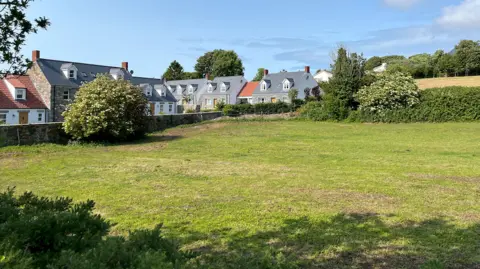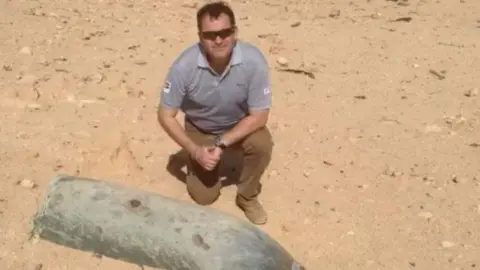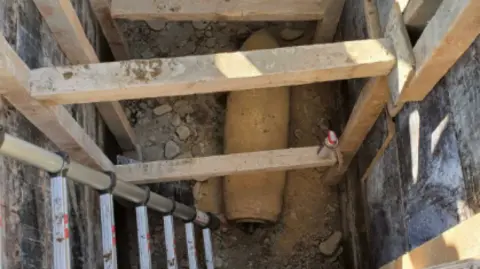Why is a field being surveyed for bombs?
 BBC
BBCA field in Guernsey is to be surveyed later after suspicions were raised there could be undetonated World War Two bombs lurking deep beneath the surface.
Invaded in June 1940, the Channel Islands were the only British territories to be occupied by the Germans during the war.
A contractor will be inspecting fields next to Route Isabelle, in St Peter Port, in the east of the island, after islanders raised concerns a previous survey had not looked deep enough for bombs.
Wartime flight paths and military records point to unexploded ordnance potentially lying beneath the field, said bomb disposal expert Ben Remfrey, who ramped up pressure on the issue in October last year.
The former soldier said the most likely reason he believed there were bombs in the Foulon Farm area because of an event on 3 March 1941, when the RAF sent squadrons from airfields in the south of England to bomb the French port of Brest, which was in German hands.
 Ben Remfrey
Ben Remfrey"The target was the German battleship, the Admiral Hipper, which was in dry dock," he said.
"It was a cloudy wet night and a number of the bombers could not identify the target and some were damaged by anti-aircraft fire."
He said a few planes flew back to base and those that still had their payload onboard had to jettison, or throw out, the bombs due to them being unstable to land with.
"The jettison area was thought to be the Hurd Deep, north of Guernsey, and the route from Brest back to southern England passed over Guernsey in some instances," he said.
What do authorities say?
In 2018, the States of Guernsey was made aware of the potential existence of these unexploded aircraft-dropped bombs near Route Isabelle.
A year later, a private specialist company was commissioned by the States to survey the land but no evidence was ever found of any ordnance.
In October 2024 Guernsey Police said there was "no strong evidence that these devices exist" and officials had "already conducted precautionary work to ensure the risk to the community is minimal".
In February 2025 Dave Le Ray, director of operations for Justice and Regulation, said "specialist advice" indicated the risk was "low" but the States had decided to "commission a deep survey" following concerns raised by residents and Mr Remfrey.
How common is it to find WW2 ordnance?
Mr Remfrey said live ordnances from World War Two continued to be found around the globe and it was important to make them safe.
"For one reason or another, a good deal of ordnance fails to function as designed when dropped - over time, the fusing mechanisms 'let go' and the bombs then detonate," he said.
"The perception is that these bombs, after 84 years, are rusty and unlikely to detonate is utterly unfounded."
 Ben Remfrey
Ben RemfreyHe said ordnance of "varying diameter" was found regularly in the Channel Islands, with most of it dealt by the police bomb disposal team.
Part of a roll bomb found on Guernsey's south coast was detonated last October, and the bottom of the cliffs in the same area were closed off as a bomb was detonated in 2023.
An unexploded WW2 bomb was found and detonated on Jersey's east coast last year.
Mr Remfrey said air dropped weapons were "generally buried out of site" and that they could remain in "near perfect condition".
He said if bombs were found, the Ministry of Defence would excavate and assess the ordnance, with safety cordons and evacuation options put in place.
Follow BBC Guernsey on X and Facebook and Instagram. Send your story ideas to [email protected].
